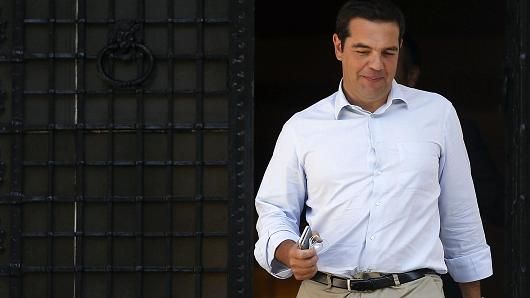 Greek Prime Minister Alexis Tsipras announced he would resign on Thursday to pave the way for early elections, saying it was up to Greeks to judge whether he adequately represented them in a battle with foreign lenders on austerity demands.
Greek Prime Minister Alexis Tsipras announced he would resign on Thursday to pave the way for early elections, saying it was up to Greeks to judge whether he adequately represented them in a battle with foreign lenders on austerity demands.
"The political mandate of the Jan. 25 elections has exhausted its limits and now the Greek people have to have their say," Tsipras said in a televised address.
Fresh from clinching a bailout deal, Tsipras opted for early elections to consolidate his position after nearly a third of lawmakers from his Syriza party refused to back the 86 billion euro ($96 billion) program in parliament last week, robbing him of a guaranteed political majority. Early elections could take place on Sept. 20, a government official said earlier Thursday.
Separately on Thursday, the European Central Bank confirmed it received a 3.2 billion euro ($3.58 billion) repayment from Greece, the fulfillment of its last significant obligation to the ECB for the next 11 months. Greece used bailout funds released earlier on Thursday to repay the bonds, held by the ECB and national central banks of euro zone countries.
Credit ratings agency Moody's said Tsipras' resignation could increase the risk of Greece failing to stick to its latest aid deal.
"Greek Prime Minister Tsipras's move to step down and call snap early elections on Sept. 20 could elevate program implementation concerns and, potentially, puts future official sector disbursements at risk," Moody's said in a statement.
Tsipras won power only in January and Greece's complex constitution has special stipulations for holding elections less than 12 months after the previous vote. Under these, President Prokopis Pavlopoulos cannot immediately call an election if Tsipras resigns, but must first consult the other major parties to see if they could form a government - a remote likelihood with the current parliamentary arithmetic.
Source: cnbc.com
 В Атырау -10
В Атырау -10